牛津译林英语7年级上册各单元语法知识汇总及练习 - 副本
- 格式:docx
- 大小:61.11 KB
- 文档页数:21
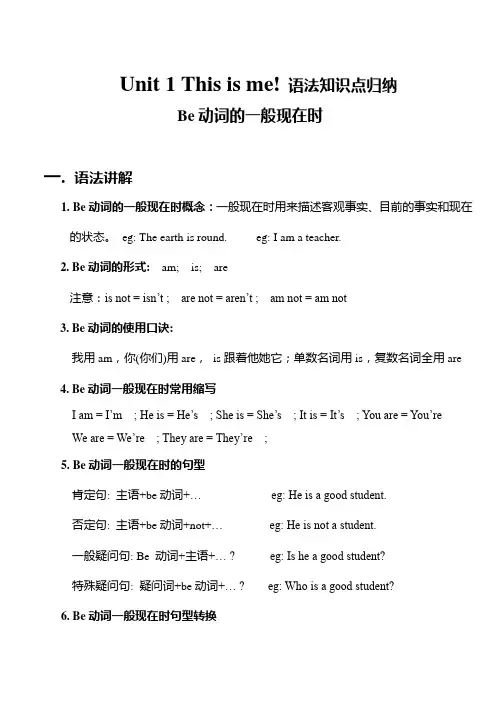
Unit 1 This is me!语法知识点归纳Be动词的一般现在时一. 语法讲解1. Be动词的一般现在时概念:一般现在时用来描述客观事实、目前的事实和现在的状态。
eg: The earth is round. eg: I am a teacher.2. Be动词的形式: am; is; are注意:is not = isn’t ; are not = aren’t ; am not = am not3. Be动词的使用口诀:我用am,你(你们)用are,is跟着他她它;单数名词用is,复数名词全用are4. Be动词一般现在时常用缩写I am = I’m ; He is = He’s ; She is = She’s ; It is = It’s ; You are = You’reWe are = We’re ; They are = They’re ;5. Be动词一般现在时的句型肯定句: 主语+be动词+… eg: He is a good student.否定句: 主语+be动词+not+… eg: He is not a student.一般疑问句: Be 动词+主语+… ? eg: Is he a good student?特殊疑问句: 疑问词+be动词+… ? eg: Who is a good student?6. Be动词一般现在时句型转换Be动词一般现在时肯定句变否定句规则:在be动词后加not, 即在am, is, are 后直接加not。
eg: They are doctors. 否定句为:They are not doctors.Be动词一般现在时肯定句变一般疑问句规则:be动词提到句首,即将am, is, are 提到句首。
eg: They are doctors. 一般疑问句为:Are they doctors?7. 注意:肯定句中如果有I, we 在变一般疑问句时,要统一变为you,译为:你/你们肯定句中如果有my, our 在变一般疑问句时,要统一变为your,译为:你的/你们的二. 专项练习I.用be动词的适当形式填空(40*2=80’)1. My brother’s birthday ____ on D ecember 11th.2. My brother with his friends _____ in the room.3. Amy and Simon _____ in the classroom.4. Maths ___ his favourite subject.5. Tom and Daniel ___ from England.6. _____ your friend in Class 17, Grade 7?7. _____ your sister and Millie in the same class?8. _____ her brother good at English?9. _____ this your father’s car?10. Here _____ some flowers for you.11. I ______ a boy. ______ you a boy? No, I _____ not.12. The dog _______ big and fat.13. Her clothes _____ over there.14. Whose socks ____ they?15. This pair of glasses ____ for Yang Ling.16. The two cups of milk ____ for me.17. Some tea ______ in the glass.18. My sister's name ______Nancy.19. _______ there any apple juice in the bottle?20. You, he and I ____ from China.21. --- How___ you? ---I ____ fine.22. I ___ David, and my family name ___ Green.23. ---What color ___ your iphone? ---It___ white.24. ---What ___ this in English? ---It___ an apple.25. James ___ my brother. David ___my brother, too. They ___ my brothers.26. Look! These____ apple trees.27. We____ good students and you____ a good teacher.28. Five and three ____ eight.29. ____ your phone number 123456?30. Where_____ your pencils?31. How much ____ his jacket?II.句型转换(10*1=10’)1. My name is Millie. (改为同义句)______ ______ Millie.2. I am a clever boy. (改为一般疑问句)______ ______ a clever boy?3. Our pens are red. (改为一般疑问句)______ ______ pens red?4. Are the boys from Xinxiang? (作否定回答)No, _______ _______.5. We are in Grade Seven. (改为否定句)______ _______ in Grade Seven.III.在下列短文中填入适当的be动词(10*1=10’)I ______ a girl. My name _______ Mary. I ______ in Class 17, Grade 7. I ______12 years old. Here ______ my family photo. Look! These ______ my parents and those _______ my grandparents. This boy ______ my brother. He ________ 15 years old now. That ______ my cat, Mimi. It ______ very lovely(可爱的).。
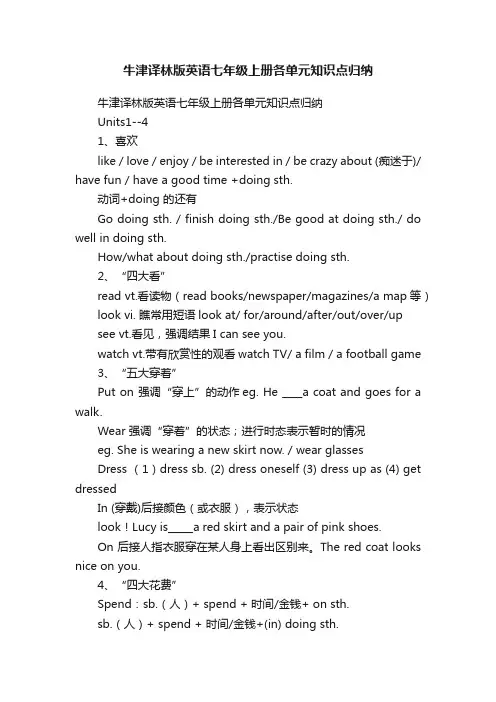
牛津译林版英语七年级上册各单元知识点归纳牛津译林版英语七年级上册各单元知识点归纳Units1--41、喜欢like / love / enjoy / be interested in / be crazy about (痴迷于)/ have fun / have a good time +doing sth.动词+doing 的还有Go doing sth. / finish doing sth./Be good at doing sth./ do well in doing sth.How/what about doing sth./practise doing sth.2、“四大看”read vt.看读物(read books/newspaper/magazines/a map等)look vi. 瞧常用短语look at/ for/around/after/out/over/upsee vt.看见,强调结果I can see you.watch vt.带有欣赏性的观看watch TV/ a film / a football game3、“五大穿着”Put on 强调“穿上”的动作eg. He ____a coat and goes for a walk.Wear 强调“穿着”的状态;进行时态表示暂时的情况eg. She is wearing a new skirt now. / wear glassesDress (1)dress sb. (2) dress oneself (3) dress up as (4) get dressedIn (穿戴)后接颜色(或衣服),表示状态look!Lucy is_____a red skirt and a pair of pink shoes.On 后接人指衣服穿在某人身上看出区别来。
The red coat looks nice on you.4、“四大花费”Spend:sb.(人)+ spend + 时间/金钱+ on sth.sb.(人)+ spend + 时间/金钱+(in) doing sth.pay:sb.(人)+pay + 金钱+for sth.cost:sth.(物) + cost + sb.+金钱Doing sth.costs + sb.+时间take:it takes sb. +时间+ to do sth.5、“三大地点副词”Home / there /here 前不加任何的介词welcome home / come here / go there6、“三大使役动词”Make sb. do sth./ have sb. do sth. / let sb.do sth.7、见面打招呼用语(1)Nice to meet you . (2) Glad to meet you . (3) How are you ? (4) How are you doing ?(5)How is it going ? (6)How is everything going? (7) What’s up?8、基数词+year(s)+old 表示“…岁”提问用“how old”名词性短语数词-year-old 也表示年龄,但其为形容词性短语“前有冠词后有名(词)”Eg. Helen is 11 years old = Helen is an 11-year-old girl.9、Let’s 与let us 的区别Let’s do sth. 指包括听者(对方)和说者(我们)都在内,表示建议Let us do sth.指“让(允许)我们做某事”而听者(对方)不做,只有“我们”做10、play+the+乐器类名词e.g. Play the pianoPlay + 球类运动play+ football / play cards / play chess11、She comes from Shanghai= She is from Shanghai . 注:如何提问Shanghai 及如何改一般疑问句12、be good at =do well in = be clever at = study sth. wellBe good at (反) be bad at do well in (反) be poor in13、介词over的用法(1)”在…正上方” There is a bridge over the river.(2)”越过” A plane flies over the house(3)”超过” There are over 20 boys in this class.(4)”结束” Class is over! / Game is ove r.14、every one 与everyone 辨析区别(1)Every one 可以与of 连用,而everyone 却不能与of连用Eg.every one of the children likes playing the computer games.(2) everyone 只指人=everybody而every one 既指人又可指物共同点:谓语动词都要用“三单”15、family 的用法:“家庭”作为整体谓语动词用“单数”He has a big family.“家人”强调成员,是复数含义,谓语动词用“原形” My family are at home.拓展:集体名词有people、class、police、sheep、deer、furniture等16、all/ both/ each/every/neither/ either 的用法all (1)三者或三者以上“全部、都”(2)all + the + 名词(all the afternoon = the whole afternoon)(3)all 放在行为动词前,名词前;be 动词后(4) all of +宾格/名词复数Both(1)两者都(2)后可跟of +宾格/名词复数Both sides of the street are grown trees.Each 指两个或两个以上“每一个”个体Each side of the street is grown trees.Every 指许多人或事物的“全体”后接名词单数Every student is here . 所有人都在。
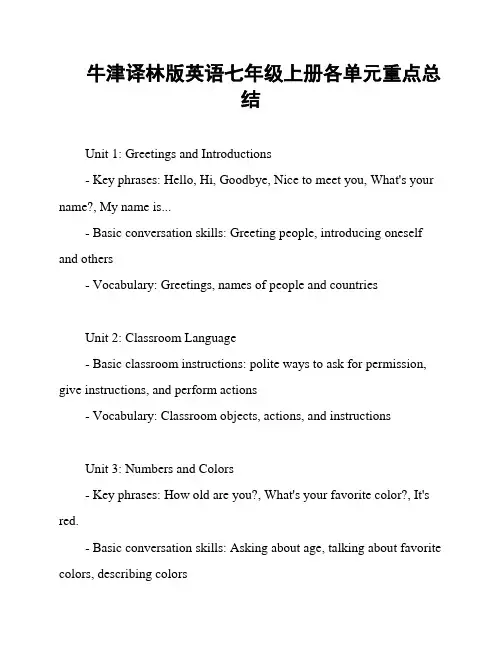
牛津译林版英语七年级上册各单元重点总结Unit 1: Greetings and Introductions- Key phrases: Hello, Hi, Goodbye, Nice to meet you, What's your name?, My name is...- Basic conversation skills: Greeting people, introducing oneself and others- Vocabulary: Greetings, names of people and countriesUnit 2: Classroom Language- Basic classroom instructions: polite ways to ask for permission, give instructions, and perform actions- Vocabulary: Classroom objects, actions, and instructionsUnit 3: Numbers and Colors- Key phrases: How old are you?, What's your favorite color?, It's red.- Basic conversation skills: Asking about age, talking about favorite colors, describing colors- Vocabulary: Numbers, colors, ageUnit 4: My Family- Key phrases: How many people are there in your family?, This is my mother/father/sister/brother.- Basic conversation skills: Talking about family members, describing family relationships- Vocabulary: Family members, possessive pronounsUnit 5: My School- Key phrases: What's your favorite subject?, Do you like...?, Yes, I do. / No, I don't.- Basic conversation skills: Talking about school subjects, expressing likes and dislikes- Vocabulary: School subjects, opinionsUnit 6: My Friends- Key phrases: Who's your best friend?, What does he/she look like?, He/She is...- Basic conversation skills: Talking about friends, describing appearance- Vocabulary: Words to describe people's physical appearanceUnit 7: Free Time Activities- Key phrases: What do you do in your free time?, I like playing football / reading books / listening to music.- Basic conversation skills: Talking about hobbies and free time activities- Vocabulary: Hobbies and leisure activitiesUnit 8: Daily Routines- Key phrases: What time do you get up/go to bed/eat breakfast?, I get up at.../Go to bed at.../Eat breakfast at...- Basic conversation skills: Talking about daily routines and telling the time- Vocabulary: Daily activities, timeUnit 9: Food and Drinks- Key phrases: Do you like...?, Yes, I do. / No, I don't., Can I have some...?, Sure, here you are.- Basic conversation skills: Talking about food preferences, ordering food and drinks- Vocabulary: Food and drinks, likes and dislikesUnit 10: Clothes- Key phrases: What are you wearing?, I'm wearing a T-shirt/trousers/skirt/shoes, etc.- Basic conversation skills: Talking about clothes and describing what someone is wearing- Vocabulary: Clothing itemsUnit 11: Weather- Key phrases: What's the weather like today?, It'ssunny/rainy/cloudy/windy, etc.- Basic conversation skills: Talking about the weather and describing weather conditions- Vocabulary: Weather words and phrasesUnit 12: Holidays and Celebrations- Key phrases: When is...?, It's on..., What do people do on...?, People usually...- Basic conversation skills: Talking about holidays and celebrations, discussing traditions and customs- Vocabulary: Holidays and celebrations, activities以上是牛津译林版英语七年级上册各单元的重点总结,希望对您有所帮助。
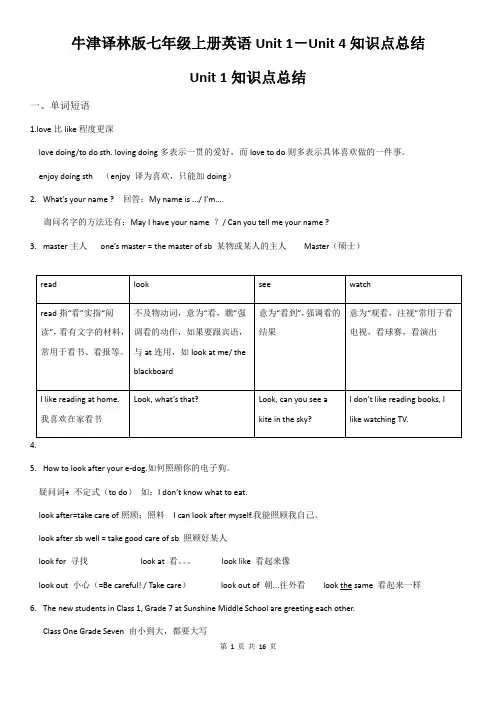
牛津译林版七年级上册英语Unit 1-Unit 4知识点总结Unit 1知识点总结一、单词短语1.love比like程度更深love doing/to do sth. loving doing多表示一贯的爱好,而love to do则多表示具体喜欢做的一件事。
enjoy doing sth (enjoy 译为喜欢,只能加doing)2.What's your name ? 回答:My name is .../ I’m....询问名字的方法还有:May I have your name ?/ Can you tell me your name ?3.master主人one’s master = the master of sb 某物或某人的主人Master(硕士)4.5.How to look after your e-dog.如何照顾你的电子狗。
疑问词+ 不定式(to do)如:I don’t know what to eat.look after=take care of照顾;照料I can look after myself.我能照顾我自己。
look after sb well = take good care of sb 照顾好某人look for 寻找look at 看。
look like 看起来像look out 小心(=Be careful! / Take care)look out of 朝...往外看look the same 看起来一样6.The new students in Class 1, Grade 7 at Sunshine Middle School are greeting each other.Class One Grade Seven 由小到大,都要大写用法相同的还有number ,lesson,unit,group,roomI’m in Grade 7.(对划线部分提问)What/ Which grade are you in?Our school has six grades.我们学校有6个年级。
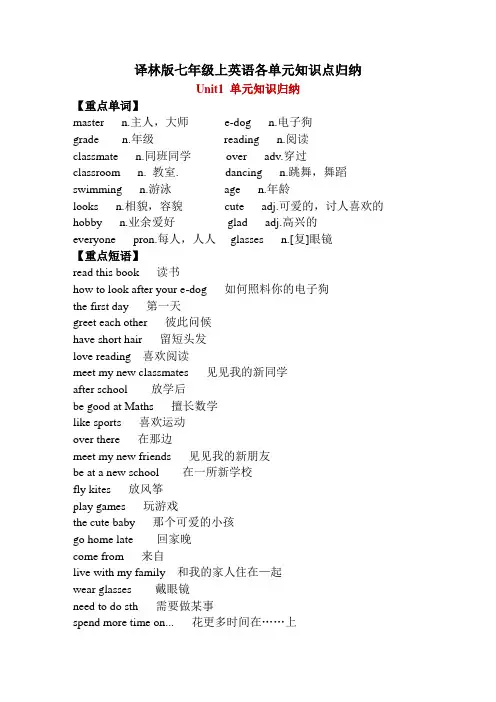
译林版七年级上英语各单元知识点归纳Unit1 单元知识归纳【重点单词】master n.主人,大师e-dog n.电子狗grade n.年级reading n.阅读classmate n.同班同学over adv.穿过classroom n. 教室. dancing n.跳舞,舞蹈swimming n.游泳age n.年龄looks n.相貌,容貌cute adj.可爱的,讨人喜欢的hobby n.业余爱好glad adj.高兴的everyone pron.每人,人人glasses n.[复]眼镜【重点短语】read this book 读书how to look after your e-dog 如何照料你的电子狗the first day 第一天greet each other 彼此问候have short hair 留短头发love reading 喜欢阅读meet my new classmates 见见我的新同学after school 放学后be good at Maths 擅长数学like sports 喜欢运动over there 在那边meet my new friends 见见我的新朋友be at a new school 在一所新学校fly kites 放风筝play games 玩游戏the cute baby 那个可爱的小孩go home late 回家晚come from 来自live with my family 和我的家人住在—起wear glasses 戴眼镜need to do sth 需要做某事spend more time on... 花更多时间在……上【典句必背】What’s your name? 你叫什么名字?Nice to meet you.见到你很髙兴。
I love reading.我爱读书。
I often play football after school.放学后我经常踢足球。
![牛津译林版英语七年级(上册)分单元知识点归纳总结[Unit1_8]]](https://uimg.taocdn.com/0e173f3e7cd184254b353535.webp)
牛津译林版英语七年级上册全册知识点归纳总结(最新)Unit one一、词汇知识点整理:look after \ take care of 照顾 ;表示look 的短语:look after照顾look at 看…;look for 寻找look like 看起来像…on the first day 在第一天 Class One, Grade Seven (先说班级,再说年级,且大写)。
play football 踢足球 after school 放学后be\come from 来自 be good at \do well in 擅长fly kites 放风筝 go home 回家listen to music 听音乐 play a game 玩游戏wear glasses 戴眼镜 at school 在学校all the lessons 所有的课程 talk about 谈论over there 那里 a lot of hobbies 许多爱好二、结构用法:love\like doing sth 喜欢做某事let’s +动词原形让我们I am\My name is 我叫welcome to +地点欢迎来到This is 这是be good at \do well in doing 擅长做in Class…Grade…在几年级几班be from = come from + 地点, 意思是“来自某地”。
He is from Nanjing. P8 他来自南京。
live with…in…和谁住在哪里live with sb 和某人住一起;live in+ 城市名,住在某地; live on the ground floor 住在一楼(用介词on)I’m …year old. 我几岁了。
year(s) old ,……岁,如果数词大于1, year 要用复数years.问年龄要用How old “几岁”提问。
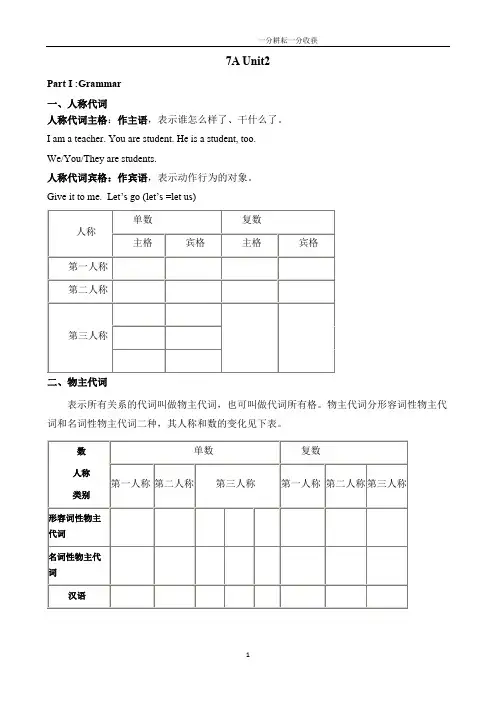
7A Unit2Part I :Grammar一、人称代词人称代词主格:作主语,表示谁怎么样了、干什么了。
I am a teacher. You are student. He is a student, too.We/You/They are students.人称代词宾格:作宾语,表示动作行为的对象。
Give it to me. Let’s go(let’s =let us)人称单数复数主格宾格主格宾格第一人称第二人称第三人称二、物主代词表示所有关系的代词叫做物主代词,也可叫做代词所有格。
物主代词分形容词性物主代词和名词性物主代词二种,其人称和数的变化见下表。
数人称类别单数复数第一人称第二人称第三人称第一人称第二人称第三人称形容词性物主代词名词性物主代词汉语注意:形容词性物主代词(my/your/his/her/its/our/their)+名词名词性物主代词则相单于形容词性物主代词+名词,故其后不必加名词。
如:Is this your book? No,,it isn’t, it’s hers(her book) This pen is mi ne.人称代词的顺序:单数的人称代词:第二人称,第三人称,第一人称(2,3,1)复数的人称代词:第一人称,第二人称,第三人称(1,2,3)【巩固练习】一、用所给代词的适当形式填空1)Are___________(he) your parents?2)Those _________(be)my friends.3)They are his _________(cousin).We are going to the park with______(they).4)________(those) is a pencil._______(it) price(价格)is one yuan.5)________(her)is my sister._______(she) name is Gina二、选择填空:( )1. She is a student, _____ name is Julia.A. itsB. herC. hersD. his( )2. Could you help _____ with _______ English, please.A. I, myB. me, meC. me, myD. my, I( )3. A friend of _____ came here yesterday.A. myB. hisC. himD. himself( )4. ______ pencil-box is beautiful. But ____ is more beautiful than ______.A. Toms, my, heB. Tom's, mine, hisC. Tom's, mine, himD. Tom's, my, his( )5. Most of ______like Chinese food.A. theyB. TheirC. ThemD. theirs( )6. Don't you let ____ help you ?A. I and my friendB. my friend and IC. my friend and meD. my friend and I to ( )7. How hard______ works!A. weB. himC. heD. his( )8. ______ have been chosen.A. I, you and heB. He, you and IC. You, he and ID. You, and me( )9. She gave the erasers to Lucy and _______ .A. IB. meC. myD. mine( )11. We bought _____ English-Chinese dictionaries.A. usB. oursC. ourselvesD. to us( )12. Most people think ______ are winners.A. oursB. ourselvesC. weD. us( )13.____ can’t find _____ car, where is it?A.Theirs, themB.They, theirC.They, theirsD.Them, theirs ( )14. — Give ______ a knife, please. —Which one is ______?A. He, himB. him, heC. him, hisD. he, his()15.—Whose shirts are these?—I think they are ________.A.yourB.mineC.myD.their三、人称代词和物主代词用所给词的适当形式填空1.That is not ______ kite. That kite is very small, but ______ is very big. (I)2.The dress is _______. Give it to _________. (she)3.Is this ______ watch? (you) No, it’s not _______ . (I)4.________ is my brother. _________ name is Jack. Look! Those stamps are ________. (he)5._________ dresses are red. (we) What colour are _________? (you)6.Here are many dolls, which one is _________ ? (she)7.I can find my toy, but where’s _________? (you)8.Show _________ your kite, OK? (they)9.I have a beautiful cat. _______name is Mimi. These cakes are _____. (it)10.Are these ______ tickets? No, ______ are not _______. _______ aren’t here. (they)11.Shall ________ have a look at that classroom? That is _________ classroom. (we)12._________ is my aunt. Do you know _________ job? _________ a nurse. (she)13.That is not _________ camera. _________ is at home. (he)14.Where are ________? I can’t find ________. Let’s call _________ parents. (they)15.Don’t touch _______. _______ not a cat, _______ a tiger! (it)Part II:Language Points1.time①时间,名词②次数,名词;一次两次三次频率:一周四次four times a weekI walk to my bowl many times a day. (划线部分提问)I go to school four times a week. (划线部分提问)2. I go to school on foot. = I walk to school.I go to school on my bike/by bike. =I go to school in my car/ by car. =I go to school by plane. =I go to school by underground. =I go to school by bus. =对交通方式提问:3. What about you?=How about you?你呢?What about doing sth. 做某事….样?去散步怎么样?提出建议或意见的句型:4. be a member of ……的一员 = be in the …… teamShe is a member of the football team. 她是足球队的一员。
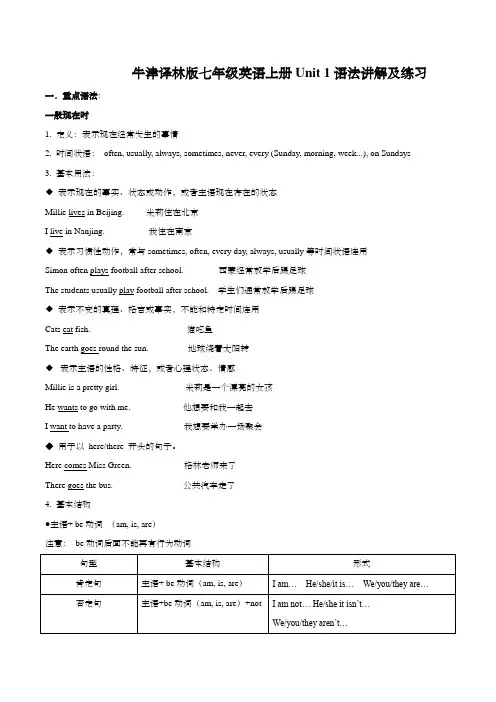
牛津译林版七年级英语上册Unit 1语法讲解及练习一.重点语法:一般现在时1. 定义:表示现在经常发生的事情2. 时间状语:often, usually, always, sometimes, never, every (Sunday, morning, week...), on Sundays3. 基本用法:◆表示现在的事实、状态或动作,或者主语现在存在的状态Millie lives in Beijing. 米莉住在北京I live in Nanjing. 我住在南京◆表示习惯性动作,常与sometimes, often, every day, always, usually等时间状语连用Simon often plays football after school. 西蒙经常放学后踢足球The students usually play football after school. 学生们通常放学后踢足球◆表示不变的真理、格言或事实,不能和特定时间连用Cats eat fish. 猫吃鱼The earth goes round the sun. 地球绕着太阳转◆表示主语的性格、特征,或者心理状态、情感Millie is a pretty girl. 米莉是一个漂亮的女孩He wants to go with me. 他想要和我一起去I want to have a party. 我想要举办一场聚会◆用于以here/there 开头的句子。
Here comes Miss Green. 格林老师来了There goes the bus. 公共汽车走了4. 基本结构●主语+ be动词(am, is, are)注意:be动词后面不能再有行为动词be动词(am, is, are)的使用:1. We use ‘am’ when the subject is _I____ .2. We use ‘are’ when the subject is _we ___, _ you __ or ___they __ .3. We use ‘is’ w hen the subject is __he __, __she or __ it ___ . be动词的使用口诀:我用am,你用are, is连着他、她、它,单数形式用is, 复数形式要用are●主语+ 行为动词行为动词的第三人称单数形式的变化规律:1、直接在词尾加s如:look-looks play-plays2、以辅音字母加y结尾, 去y为i加es如:fly-flies study-studiestry-tries carry-carries3、以sh、ch、s、x、o结尾加es如:guess-guesses wash—washescatch-catches mix-mixesgo-goes do-does★ have的第三人称单数形式是has二.语音知识:(见教材)三.随堂练习-----语法专练用相应的be动词填空1. I an English teacher.2. Sandy from China.3. He polite.4. We in Class 3, Grade 7.5. Mrs Fang and Mr Liu doctors.6. The girls in the classroom.7. Our football team the best in the city.8. Mr. Li our Maths teacher.9. Simon a member of the Reading Club?10. Simon and Millie friends?选择填空:( )1. —What ______ your uncle? —He’s a policeman.A. isB. areC. doD. does( )2. The girl doesn’t like the skirt ______ red flowers.A. haveB. hasC. withD. and( )3. It is going to rain. He must ______now .A. runs to homeB. run to homeC. runs homeD. run home ( ) 4.Do you often go in summer ?A.swimB.swimsC.swimingD.swimming ( ) 5.I usually go in the morning.A.runB.runsC.runingD.running ( ) 6.Simon with his friends football on Tuesday afternoon.A.playB.playsC.play theD.plays the ( )7.Sam his homework at school.A.do esn’tB.doesn’t doC.don’t doD.doesn’t does ( )8.After he breakfast, he always his dog for a walk.A.have / takesB.has / takeC.haves / takesD.has / takes 用所给动词的适当形式填空1.Daniel (wear) a pair of glasses.2.There are six (fish) in the bag.3.Alice (study) English at school.4.I always go (run) in the morning.5.She (go) to work by bike every day.6.Sometimes Sandy (fly) a kite at weekends.7.My father often (watch) TV in the evening.8.His mother usually (wash) the clothes on Sundays.9.We often have dinner at my (grandparents) home.10.He enjoys .He often goes in the (swim) pool.11. __________your aunts good at __________ (make) cakes?12. He __________ (not like) __________ (drink) milk.13. How __________ (be) your grandfather?14. My little cat really __________ (want) __________ (eat) fish.15. He __________ (not know) where __________ (sit).16. Each of us can __________ (sing) an English song.17. Who __________ (bring) the dog here?18. There are lots of things for ________ (he) ________ (do) now.19. Our teacher always __________ (say) every student can ________ (be) very good.20. ________(not late) for school next time.句型转换:1.I do my homework in the evening. (改为否定句)I my homework in the evening.2.He does his homework at home.(改为一般疑问句,并作肯定回答)he his homework at home ? , he .3.They play football after school .(对画线部分提问)they football ?4.She goes to school by bus .(对画线部分提问)she to school ?。
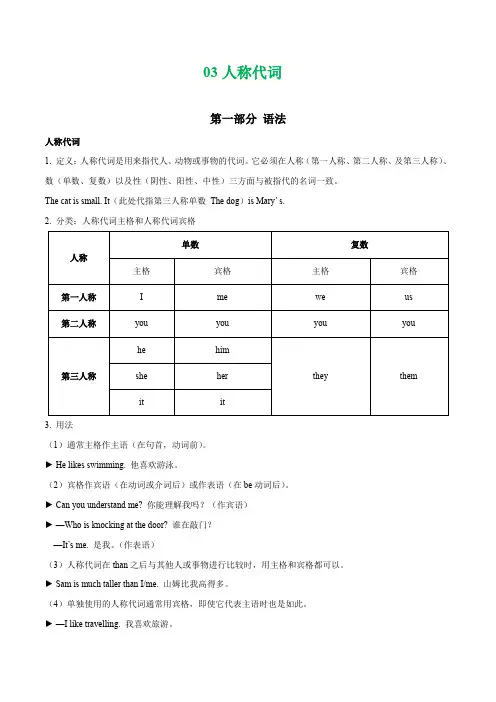
03人称代词第一部分语法人称代词1. 定义:人称代词是用来指代人、动物或事物的代词。
它必须在人称(第一人称、第二人称、及第三人称)、数(单数、复数)以及性(阴性、阳性、中性)三方面与被指代的名词一致。
The cat is small. It(此处代指第三人称单数The dog)is Mary’ s.2. 分类:人称代词主格和人称代词宾格3. 用法(1)通常主格作主语(在句首,动词前)。
► He likes swimming. 他喜欢游泳。
(2)宾格作宾语(在动词或介词后)或作表语(在be动词后)。
► Can you understand me? 你能理解我吗?(作宾语)► —Who is knocking at the door? 谁在敲门?—It’s me. 是我。
(作表语)(3)人称代词在than之后与其他人或事物进行比较时,用主格和宾格都可以。
► Sam is much taller than I/me. 山姆比我高得多。
(4)单独使用的人称代词通常用宾格,即使它代表主语时也是如此。
► —I like travelling. 我喜欢旅游。
—Me too. 我也喜欢。
(5)人称代词并列时的排列顺序。
①人称代词单数并列作主语时,其顺序为:第二人称→第三人称→第一人称,即you, he/she/it and I(若是承担错误责任,第一人称应当先)。
► It was I and John that made her angry. 是我和约翰使她生气了。
①复数人称代词作主语时,其顺序为:第一人称→第二人称→第三人称,即we, you and they。
【2020•天津市】I bought a present for ________. I hope you like ________.A.your; this B.yours; that C.you; it D.you; one【答案】C【解析】句意:我给你买了一件礼物。
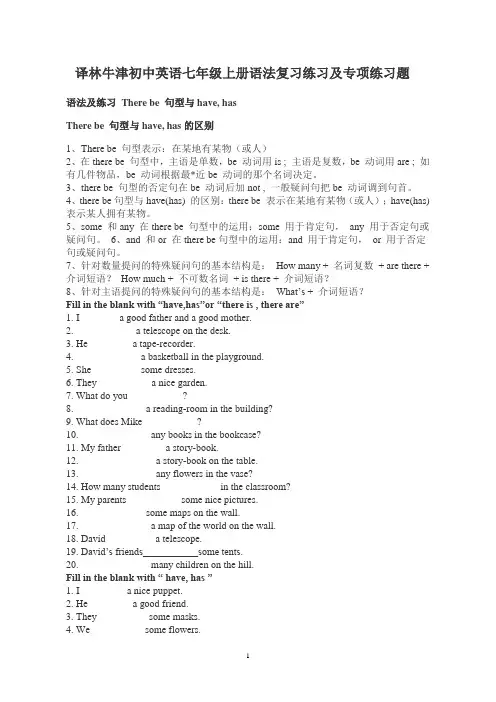
译林牛津初中英语七年级上册语法复习练习及专项练习题语法及练习There be 句型与have, hasThere be 句型与have, has的区别1、There be 句型表示:在某地有某物(或人)2、在there be 句型中,主语是单数,be 动词用is ; 主语是复数,be 动词用are ; 如有几件物品,be 动词根据最*近be 动词的那个名词决定。
3、there be 句型的否定句在be 动词后加not , 一般疑问句把be 动词调到句首。
4、there be句型与have(has) 的区别:there be 表示在某地有某物(或人);have(has) 表示某人拥有某物。
5、some 和any 在there be 句型中的运用:some 用于肯定句,any 用于否定句或疑问句。
6、and 和or 在there be句型中的运用:and 用于肯定句,or 用于否定句或疑问句。
7、针对数量提问的特殊疑问句的基本结构是:How many + 名词复数+ are there + 介词短语?How much + 不可数名词+ is there + 介词短语?8、针对主语提问的特殊疑问句的基本结构是:What’s + 介词短语?Fill in the blank with “have,has”or “there is , there are”1. I________a good father and a good mother.2. ____________a telescope on the desk.3. He_________a tape-recorder.4. _____________a basketball in the playground.5. She__________some dresses.6. They___________a nice garden.7. What do you___________?8. ______________a reading-room in the building?9. What does Mike___________?10. ______________any books in the bookcase?11. My father_________a story-book.12. _______________a story-book on the table.13. _______________any flowers in the vase?14. How many students____________in the classroom?15. My parents___________some nice pictures.16. _____________some maps on the wall.17. ______________a map of the world on the wall.18. David__________a telescope.19. David’s friends___________some tents.20. ______________many children on the hill.Fill in the blank with “ have, has ”1. I_________ a nice puppet.2. He_________a good friend.3. They__________ some masks.4. We___________some flowers.5. She___________ a duck.6. My father____________ a new bike.7. Her mother___________a vase.8. Our teacher_________ an English book.9. Our teachers___________a basketball.10. Their parents___________some blankets11. Nancy_________many skirts.12. David__________some jackets.13. My friends__________a football.14. What do you__________?15. What does Mike__________?16. What do your friends___________?17. What does Helen___________?18. His brother________a basketball.19. Her sister_________a nice doll.20. Miss Li__________an English book.语法及练习be动词Be 动词的用法:(1) Am--was Is --was Are--were 口诀:我用am, 你用are, is用在他她它,复数全用are。
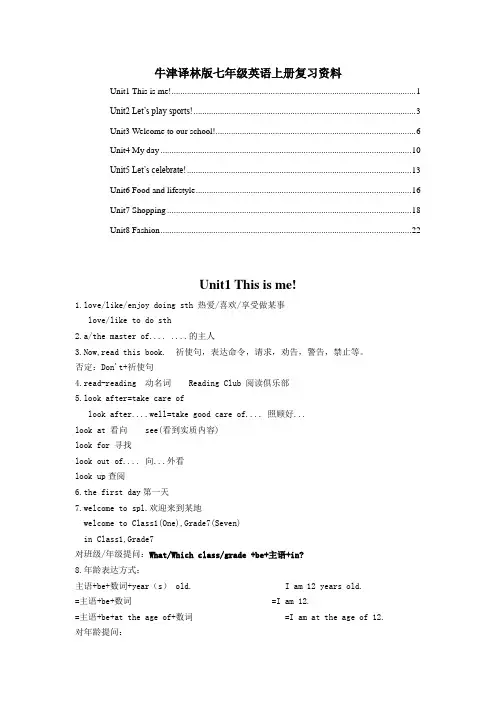
牛津译林版七年级英语上册复习资料Unit1 This is me! (1)Unit2 Let’s play sports! (3)Unit3 Welcome to our school! (6)Unit4 My day (10)Unit5 Let’s celebrate! (13)Unit6 Food and lifestyle (16)Unit7 Shopping (18)Unit8 Fashion (22)Unit1 This is me!1.love/like/enjoy doing sth 热爱/喜欢/享受做某事love/like to do sth2.a/the master of.... ....的主人3.Now,read this book. 祈使句,表达命令,请求,劝告,警告,禁止等。
否定:Don't+祈使句4.read-reading 动名词 Reading Club 阅读俱乐部5.look after=take care oflook after....well=take good care of.... 照顾好...look at 看向 see(看到实质内容)look for 寻找look out of.... 向...外看look up查阅6.the first day第一天7.welcome to spl.欢迎来到某地welcome to Class1(One),Grade7(Seven)in Class1,Grade7对班级/年级提问:What/Which class/grade +be+主语+in?8.年龄表达方式:主语+be+数词+year(s) old. I am 12 years old.=主语+be+数词 =I am 12.=主语+be+at the age of+数词 =I am at the age of 12.对年龄提问:How old+be+主语? How old are you?=What’s sb’s age? =What’s your age?xx-year-old ....岁的 a 12-year-old girl 一位12岁的小女孩9.play+球类运动 play footballplay the+乐器名词 play the piano10.after class/school/lunch....11.be from=come from 来自Where +be+主语+from?=Where+助动词+主语+come from?12.be good at (doing ) sth=do well in (doing) sth 擅长做某事(=do sth well)13.★Be动词的一般现在时14.at the age of... 在...岁时15.go walking➡go+v-ing=go for a walkgo swimming=go for a swim16.glad/nice to meet you. ➡It's glad/nice to meet you.It’s+adj.+to do sth做某事....17.I see.我明白了。
牛津译林版七年级上册英语各单元课本知识点总结汇编Unit1一、短语I love e-dogs 我爱电子狗Welcome to sp 欢迎来到某地tall and slim 又高又苗条be from=come from 来自look at =have a look at =take a look at 看一看write about sth 写关于…talk to/with sb 和某人交谈glad to meet you 很高兴见到你wear a pair of glasses 戴一副眼镜look after=take care of 照顾read books/magazines 读书、杂志greet each other 互相问候let sb do sth 让某人做某事be good at=do well in 擅长+doing sthplay football 踢足球at school=in the school 在学校go swimming 去游泳how to do sth 如何做某事二、句子1.I have short hair=My hair is short 我的头发是短的/我有一头短发(头发不可数,不能有a)2.Let ’s meet my new classmates.让我们去见见新同学3.What’s he like=What does he look like?他长得什么样?4.Tell sb about sth=Tell sth to sb 告诉某人某事5.This is my cousin Andy 这是我表弟安迪6.The new students in Class1,Grade 7 at Sunshine Middle School 阳光中学七年级一班7.Now I live with my family in Beijing 现在我和父母住在北京8.They are all very nice 他们都很友好/善良9.The first day at Sunshine Middle School 在阳光中学的第一天三、语法:连系动词be 的一般现在时动词be 的三变化am is are. 我(I)用am ,你(you)用are ,is 用于他(he)她(she)它(it),单数名词用is,复数名词都用are句型结构:1、肯定句:主语+am\is\are …It is a football.2、否定句:主语+am\is\are+not…It is not a football.3、一般疑问句:Am\Is\Are+主语+其他?Is it a football? 回答Yes, it is. No, it isn’t4、特殊疑问句:疑问句+am/is/are +主语+其他?What’s your name?Unit2一、短语like to do/doing sth 喜欢做某事twice a day 一天两次walk to sp=go to sp on foot 走去/步行去play tennis 打网球What about=how about …怎么样like…very much 非常喜欢…a member of……中的一名成员in one’s free time 在某人闲暇时make sb/sth +adj 使某人/某物怎么样want to do sth=would like to do 想要做某事watch ball games 看球赛Sometimes=at times=from time toReading is fun 读书很有趣once a day 一天一次three/four …times a day 一天…次football player 足球选手football star 足球明星play football well 篮球打得好listen to music 听音乐make sb/sth +v 原型使某人/某物做…play in the next World Cup 踢进下一个世界杯 a piece of information 一条信息answer a question 回答问题stay at home 待在家a lot of=lots of =many/much 许多talk with/to sb about sth 与某人谈论某事play with sb 和某人玩二、句子1.Eddie, do you like sports?艾迪,你喜欢体育吗?2.I walk to my bowl many times a day.我一天里走向我的碗许多次3.What is your favourite sport?=What sport do you like best?你最喜欢的体育运动是什么?4.He was born/comes from Guangdong, but now lives in Beijing.他出生于广东,但是现在居住在北京。
Unit 1--2【语法精讲】一、一般现在时的构成主要用动词原形_______/________表示,如果主语是第三人称单数,则用动词的________。
e.g. He is an interesting actor. We all like him.【小试牛刀】1. Amy and Kitty are good friends.否定句:____________________________________.一般疑问句:________________________________?特殊疑问句:________________________________?2. She does his homework every night.否定句:____________________________________.一般疑问句:________________________________?特殊疑问句:________________________________?二、一般现在时的用法1.表示经常性或习惯性的动作或存在的状态。
常与频率的副词和时间状语连用。
时间状语:______________________________________________________.频率副词进行排序:______________________________________________.★频度副词的位置一般放在be动词__________,行为动词__________.[译]①她有时很忙。
She __________________________________________.②我们经常去那儿。
We_______________________________________.★对频度副词提问要用______________.[例]Isometimes write to my cousin Andy.(对划线部分提问)__________________ do you write to your cousin Andy?【小试牛刀】1. I don’t think fast food is good for our health, so I __________ go to McDonald’s.A. seldomB. alwaysC. usuallyD. often2. --Steve, _______ do you play basketball after school?--Twice a week. It can keep me healthy.A. how farB. how soonC. how longD. how often★2.表示_______________________e.g.The earth______________(be) round.在时间状语从句和条件状语从句中,主句是___________,从句用_____________。
牛津译林7上UNITs(1-8)全册高频考点词汇语法考题总结(上)(提优训练考题一----四卷)第一卷高频考点词汇提优精练(35分)一、词汇运用(本大题共8分,每题1分)1. Andy, how do we _________ (庆祝) Halloween?2. I think the pair of shoes is too__________(昂贵的).3. The watermelon juice ____________ (品尝) nice. I like it very much.4. The _________(售货员)in the different shops show Amy different wallets.5 The weather in Wuxi is quite _________(same) from that in Harbin6. Eating ___________ (little) meat and more vegetables is good for us .7. We have many ____________ (woman) teachers in our school.8. It’s about one and a half ______ (hour) walk from my home to the Starlight Shopping Mall.二、动词填空(本大题共8分,每小题1分)1. We’re sure __________ (finish) the work on time.2. Derek, _______ (not talk ) in class again. OK?3. There _______ (be) any bread or milk in the fridge.4. I am interested in _________ (collect ) stamps ,but my brother isn’t.5. You can find cute hair clips________ (match) your sweater in our shop.6. There are some children _________ (let) off fireworks in the park.7. We are planning _________ (go) to Beijing for the winter holiday.8. One of them often __________ (fly) kites in the park at the weekend三、句型转换(本大题共5分,每小题0.5分)1. The boy in a white shirt is my brother. (对划线部分提问)boy is brother?2. The gift is not very cheap . (改为同义句)The gift costs3. The dress matches your shoes very well..(改为同义句)The dress _ _ ______ your shoes.4. There are two cartons of milk on the table . (对划线部分提问)_ __ milk ___ there on the table ?四、翻译句子(本大题共9分,每小题0.5分)1. 不要捉弄那些老人。
新教材牛津译林版英语7A全册重要语法和专项训练现在进行时练习Ⅰ.按要求改写句子1.The boy is playing basketball.否定句:____________________________一般疑问句:_________________________肯定回答:__________________________否定回答:__________________________对“is playing basketball”提问:__________________________对“The boy”提问:__________________________2.They are singing in the classroom.否定句:____________________________一般疑问句:_________________________肯定回答:__________________________否定回答:__________________________对“are singing ”提问:__________________________对“in the classroom”提问:__________________________3.仿照例句造句:Model:read,a book--What are you doing?--I'm reading a book.1.read a new book________________2.clean the blackboard________________3.she,the window,open,now.(用现在进行时连词成句.)_____________________4.The birds are singing in the tree.(就划线部分提问)________________________5.is,who,the window,cleaning?(连词成句)______________________6.The children are playing games near the house.(就划线部分提问) ________________________7.She is closing the door now.(改成否定句)______________________8.You are doing your homework.(用"I"作主语改写句子)______________________9.they,the tree,sing,now,under.(用现在进行时连词成句.)_____________________10.The Young Pioneers are helping the old woman.(改成一般疑问句)______________________II.单项选择()1.我在照看孩子.(A)I am looking after the baby.(B)I'm look aftering the baby.(C)I look am aftering the baby.(D)I looking after the baby.( )2._____friend's making______a kite.(A)I,me (B)My,my (C)My,me (D)His,his( )3.Is the woman ______ yellow your teacher?(A)in (B)putting on (C)wearing (D)having( )4.Look!The twins_____their mother do the housework. (A)are wanting (B)help (C)are helping (D)are looking( )5._____are the birds doing? They are singing in a tree. (A)Who (B)What (C)How (D)Where( )6.Is she____something?(A)eat (B)eating (C)eatting (D)eats( )7.你在干什么?(A)What is you doing? (B)What are you do?(C)What are you doing? (D)What do you do?( )8.What are you listening_____?(A)/ (B)for (C)at (D)to( )9.我正在听他说话.(A)I listening to him. (B)I'm listening to him.(C)I'm listen to him. (D)I'm listening him.( )10.They are_____their clothes.(A)makeing (B)putting (C)put away (D)putting on( )11.Listen! She____in the classroom.(A)is singing (B)sing (C)to sing (D)is sing( )12.Today Jim______ his white shirt and brown trousers. (A)is putting on (B)wear (C)put on (D)is wearing( )13.______are you eating?I'm eating______meat.(A)What,some (B)Which,any (C)Where,not (D)What,a( )14.They______TV in the evening.They do their homework. (A)are watching (B)can't watching (C)don't watch (D)don't watching( )15.The children_____football.(A)is playing (B)are playing (C)play the (D)play a( )16.They are flying kites.(A)他们喜欢放风筝. (B)他们在放风筝吗?(C)他们在放风筝. (D)他们常放风筝.( )17.Here are many books. Please_____them.(A)look (B)write (C)count (D)taking( )18.Look,They are swimming in the river.I want_____you.(A)to go with (B)go with (C)helping (D)help( )19.The man_____(work)mear the house now.( )20.Look.Lucy is_____a new bike today.(A)jumping (B)running (C)riding (D)takeingIII.用现在进行时完成下列句子:1.What_________you__________(do)?2.I_____________(sing) an English song.3.What________he____________(mend)?4.He______________(mend) a car.5.______you__________(fly) a kite?Yes,_______.6.______she___________(sit) in the boat?7.______you_____________(ask) questions?8.We_______________(play) games now.IV.翻译1.我正在读英语。
牛津译林版七年级上册英语各单元语法知识点复习提纲Unit1 Dream homes【重点词汇】1. shareshare作及物动词,意为“分享”。
常用结构:share sth. with sb.意为“和某人合用某物;和某人分享某物”。
如:I'm afraid you have to share a table with others.我恐怕你得和别人合用一张桌子。
I often share my snacks with my classmates.我经常和同学分享零食。
2. dreamdream作名词时,意为“梦,梦想”;作形容词时,意为“理想的,不切实际的”;作动词时,意为“做梦”,常用于结构:dream of/about...(梦到……)或dream of/ about doing sth.梦想做某事。
如:Millie has a dream to have a big house米莉梦想拥有一幢大房子My dream house is a house with a big garden.我梦寐以求的房子是一幢带有大花园的房子。
I dreamed of my English teacher last night.我昨晚梦到了我的英语老师Amy dreams of being a singer when she grows up.埃米梦想长大后成为一名歌手。
3. ownown作形容词.意为“自己的,属于自己的”,常和形容词性物主代词连用,构成短语of one'sown,表示“属于某人自己的”,on one's own = alone,意为“独自地”。
own作动词时,表示“拥有”。
如:I have my own computer我有属于我自己的电脑。
That's a car of her own.那是她自己的汽车。
He lives on his own.他一个人生活。
牛津译林版七年级上册英语Unit 7语法知识点总结Comic Strip知识点01 hate 教材P80【用法详解】hate v. 讨厌,恨同义词:dislikehate doing sth (经常性)讨厌做某事I hate singing in public. 我讨厌在公共场合唱歌。
hate to do sth (偶尔)讨厌做某事He hates to swim on rainy days. 他讨厌在雨天去游泳。
hate sb to do sth 讨厌某人做某事I hate him to talk so much. 我讨厌他说那么多。
【典例讲解】Amy _________(hate)that boy because he took away her favourite toy.【答案】hated【解析】句意:艾米讨厌那个男孩,因为他拿走了她最喜欢的玩具。
根据从句中的动词took 可知,句子用的是一般过去时,主从句动作发生的时间要保持一致,所以主句的应该也用一般过去时,所以填hated。
知识点02 carry 教材P80【用法详解】carry v. 拿、提、搬carry sth to a place 把某物拿到某地carry sth for sb 为某人拿某物Please carry the box for the teacher. 请为老师搬那个盒子。
【典例讲解】This box seems _____ for us to__________ .A.light enough; carryB.enough light; carry itC.easily enough; carry itD.enough easily; carry【答案】A【解析】句意:这个箱子似乎足够轻,我们搬得动。
考查enough位置和及物动词的用法。
enough足够的(地),修饰形容词或副词时要后置,故排除B和D;系动词seems后接形容词,排除C。
牛津译林英语7年级上册各单元语法知识汇总及练习Unit 1 动词Be的一般现在时be动词有人称和数方面的变化。
对于动词be,不管是在肯定句、否定句还是一般疑问句中都起着非常重要的作用。
下面分别介绍动词be的一些特定用法。
一、be动词的意义动词be (am, is, are)说明身份、年龄、状态等I am a student.I am 13 years old.I’m very healthy.二、be动词的人称变化:第一人称I,后面的动词用am;第三人称he/she/it, 后面的动词用is;第一人称复数we, 第二人称you, 第三人称复数they,后面的动词用are.如果主语是代词,非正式行文中,Be与前面的主语可以缩写:I am=I'm You are=You're She is=She's He is=He'sIt is=It's We are=We're They are=They're非正式行文中,is/are 与not可以缩写。
例:is not=isn't are not=aren't主要句式:1. 肯定句式主语+be( ____\ ____\ _____)+其他。
2. 否定句式主语+be( ____\ ____\ _____)+not+其他。
3. 一般疑问句将be( ____\ ___\ ___)提前,即:Be( ____\ ___\ ___)+主语+其他?(第一人称变为第二人称)肯定回答:Yes,主语(必须是_____词)+be( ____\ ____\ _____)(主语和Be动词不能缩写)否定回答:No,主语(必须是_____词)+be( ____\ ____\ _____)+not(必须缩写____\ _____)肯定:It is a book. →否定:It is not a book. /It isn’t a book.I am a student. →否定:I am not a student. /I’m not a student.You are my friend. →否定:Yo u are not my friend. /You aren’t my friend.一般疑问句:回答一般疑问句时,主语必须是代词肯定:I am a student. → 一般疑问:Are you a student?She is from China. → 一般疑问:Is she from China?They are nurses. → 一般疑问:My book is on the table. → 一般疑问:John 是中国人吗?→ 一般疑问:这本书有趣吗?→ 一般疑问:一、用am, is, are 填空1. I _____ a student.2. You ____ a doctor.3. ____she from Jinan?4. _____you American?5. He _____ in Class 4, Grade 1.6. It_____ a car.7. They ____ cars8. ____ your mother in China?9. ____your friends in New York?10. What ____her name?11. These _____ buses.12. Those _____oranges.13. Where _____ her mother?14. How old _____your teacher?15. What class _____ you in?16. —I ______ a boy. ______ you a boy?—No, I _____ not.17. T he girl______ Jack’s sister.18. The dog _______ tall and fat.19. The man with big eyes _______ a teacher.20. ______ your brother in the classroom?21. —Where _____ your mother?—She ______ at home.22. How _______ your father?23. Mike and Liu Tao ______ at school.24. Whose dress ______ this?25. Whose socks ______ they?26. That ______ my red skirt.27. Who ______ I?28. The jeans ______ on the desk.29. Here ______ a scarf for you.30. Here ______ some sweaters for you.31. The black gloves ______ for Su Yang.32. This pair of gloves ______ for Yang Ling.二、在下面的短文中填上恰当的be动词。
I ______ a girl. My name _______ Mary. I ______ in Class 2, Grade 7. I ______ 12 years old. Here ______ my family photo. Look! These ______ my parents and those _______ my grandparents. This boy ______ my brother. He ________ 15 years old now. That ______ my cat, Mimi. It ______ very lovely.Unit 2 行为动词的一般现在时什么情况下用行为动词的一般现在时呢?①当这个动作经常发生或表示习惯性的动作时,通常用一般现在时,它经常与表示频度的时间状语连用,如,当句子中有every day, every year ,on Sunday, in the morning ,often, sometimes, usually, at one o’clock,等词时,用一般现在时。
He gets up at 6 o’clock.She usually watches TV in the evening.Sometimes he goes to school by car.Tom often flies a kite on Sunday.②表示目前的爱好、能力等。
She sings very well.③表示不受时限的客观事实。
Fish live in water.只有第三人称单数动词才要变,其他人称(I, you ,we ,they)则用动词的原形。
当主语是第三人称单数时,行为动词的一般现在时通常有三种变化:1、多数在动词后加s。
play—plays like—likes read—reads sing—singsdance—dances cook—cooks look—looks2、以s,x,sh,ch,o结尾的动词加es。
go—goes wash--washes watch-watches catch-catches do-does 3、以辅音字母加y结尾,把y改i再加es。
fly—flies study—studies try-tries4、特殊变化have-has写出下列动词的正确形式:1. I (go) to school at seven in the morning.2. Mike (do) his homework at eight in the evening.3. His father often (read) books in the library on Saturday.4. My mother usually (watch) TV plays at home.5. My cousin sometimes (play) cards with me.6. —you often (study ) after school?—Yes , I do.7. Mike and Tom usually (fly) kites on Sunday.8. They (go) to school by bus every day.9. She (go) to school by bus every day.10. We usually (listen) to the radio in the morning.11. He usually (listen) to the radio in the morning.12. —he usually (listen) to the music at home?—No, he主要句式:一、否定句:一般现在时的否定式是在动词原形前加助动词do not (don’t );主语是第三人称单数时在动词原形前加助动词does not (doesn’t),其结构为:1)主语+ don’t+ 动词原形They don’t work here.I don’t go to school on Sundays.2)主语(第三人称单数)+ doesn’t+ 动词原形She doesn’t like sports.The boy doesn’t study hard.注意*:如句中用了never(从不),hardly(很少、几乎不)等词来表示否定意义,就不能再使用助动词don’t 或doesn’t , 试比较:I don’t know you.I hardly know you.I don’t hardly know you.二、疑问句:一般现在时的疑问式在句首加助动词do, 主语为第三人称单数时在句首加does,其结构是:1)Do + 主语+ 动词原形…?They live near our school.→Do they live near our school?The students like learning English.→Do the students like learning English?2)Does + 主语(第三人称单数)+ 动词原形…?He watches TV every evening.→Does he watch TV every evening?My father teaches Chinese.→Does your father teach Chinese?简略回答用助动词do/does 和don’t/doesn’t 代替行为动词。